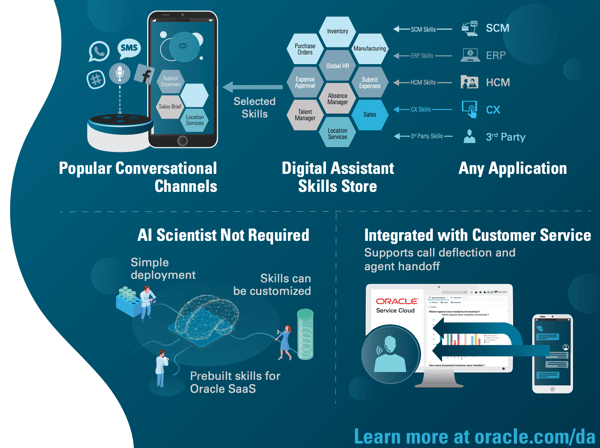ERP systems have always been a foundational component of Oracle’s software portfolio. At their recent Oracle OpenWorld conference, they made several announcements that highlight the continued importance that ERP innovation plays in their success.
Most announcements were about Oracle ERP Cloud and NetSuite ERP. This doesn’t mean Oracle isn’t improving their standard products like JD Edwards and PeopleSoft. Actually, there were many sessions about these two products, including sessions focused on the new updates to JD Edwards released this July and the new chatbots for PeopleSoft that were announced this August.

NetSuite announcements at Oracle OpenWorld
NetSuite made several announcements at Oracle OpenWorld. The most important one was about the move of their products to Oracle Cloud Infrastructure (OCI). Also known as Oracle Gen 2 Cloud, this infrastructure includes advanced technology such as artificial intelligence (AI) and machine learning (ML).
OCI was built for Oracle’s enterprise customers who needed better storage and data computing capabilities. Many enterprise consumers needed to optimize their cloud-based networks. Besides technology, OCI includes a few dozen services that help companies manage their IT stack. This lets companies have more control over their data, improve availability, and benefit from better security.
Oracle claims that moving to OCI will improve customer satisfaction with NetSuite considering features such as:
-
- Better availability, scalability, and flexibility to support growth without significant investment
- New services help companies create and deploy applications on a single cloud platform to eliminate silos and improve visibility
- AI and ML provide companies with valuable insights across all systems using the platform
- OCI will eventually allow NetSuite customers to leverage the new Oracle Autonomous Database, which is fully automated
NetSuite’s move to OCI makes it easier for companies to adopt their products and optimize their performance. The vendor can allocate resources from infrastructure maintenance to product development. OCI is global, allowing NetSuite to expand its geographical presence. Finally, NetSuite can improve its products faster and deploy changes without disrupting their customers’ business operations.
The major challenge NetSuite and its customers have is the transition process from one infrastructure to another. This type of project requires complex planning and advanced expertise. This transition is a great opportunity for companies to clean their data or improve their business processes.
NetSuite’s functionally improved in several areas, the most notable changes include:
-
- New predictive risk management features added to the Supply Chain Control Tower and a new warehouse management system help supply chain and distribution functions
- Financials includes new features for multi-subsidiary accounting and advanced import of banking data
- Personalized Catalog Views and insights based on merchandising attributes are big commerce enhancements
- Analytics, with 17 new Industry Role SuiteAnalytics Workbooks that improve visibility into critical areas such as procurement and inventory
NetSuite delivered enhancements to its SuiteSuccess pre-configured solution for verticals. The new features improve the SuiteSuccess for Restaurant & Hospitality and SuiteSuccess for Food & Beverage. Furthermore, SuiteSuccess for Planning & Budgeting is now available across seven industries.
Oracle ERP Cloud announcements
Oracle announced new updates to Oracle Enterprise Resource Planning (ERP) Cloud and Enterprise Performance Management (EPM) Cloud. The focus this year has been on intelligent technology such as digital assistants and the Internet of Things (IoT). The new digital assistants can be used to automate repetitive tasks, and Intelligent Document Recognition uses self-learning to improve the import of financial data from documents. Also, IoT Monetization allows companies to use IoT to track and optimize usage, generating more revenue.
 Source: Oracle
Source: Oracle
Another major announcement was a new solution for Integrated Business Planning and Execution, which combines elements of the two products mentioned above. Its purpose is to provide companies with end to end planning that brings together finance and supply chain departments. The solution is based on one unified data model that contains information needed to plan and execute operations while identifying and preventing potential issues. These features improve visibility across the product and service lifecycle, from introduction and budgeting to marketing, sales and operations planning.
As supply chains become more global and difficult to manage, companies must improve visibility outside their company. The new Oracle Business Network was designed for B2B companies that need to find and connect with partners, exchange electronic documents, and improve trading relationships. An integration with DataFox, Oracle’s AI data engine, is planned for the future.
To further help supply chain professionals, Oracle expanded Oracle Supply Chain Management (SCM) Cloud with new collaboration, integration, and digital assistant capabilities. Oracle Digital Assistant for Supply Chain Management uses a conversational user interface to streamline the automation of mundane tasks. While its initial focus is on logistics, the digital assistants will expand to the entire supply chain.
This is important because generic robotic process automation (RPA) software isn’t always the best choice for specific needs. G2 data shows that RPA adoption is a challenge for companies to implement and use (see below). Creating customized assistants is difficult and is one of the reasons many companies are slow to adopt.
RPA software adoption (based on 683 reviews posted by RPA users worldwide, as of Oct. 1, 2019)
RPA user review:
Sometimes it is difficult to handle the software and I get overloaded with all the features. It is also sometimes really time-consuming to find a solution for special needs or needs a lot of steps to cover special processes.
Finally, Oracle released its first Oracle Analytics for Applications, which is a prepackaged enterprise analytics for Fusion ERP. The new solution provides the following benefits:
-
- Includes a data warehouse, data discovery features, and dashboards
- Delivers prebuilt insights accessible on desktop and mobile devices
- Allows companies to combine external sources with Oracle ERP Cloud data
- Reduces the need for IT resources since database design and tuning aren’t needed
Oracle is pushing cloud ERP out of its comfort zone
While the cloud delivery model significantly improved ERP systems, many vendors fell behind on adopting new technologies such as AI and IoT. Unfortunately, moving ERP to the cloud only solved a few challenges, including implementation and maintenance. Companies using ERP still struggle with rigid systems. As our data shows, reviewers are very satisfied with the Ease of Use on their ERP systems, while the Ease of Setup is still a challenge. Users are generally satisfied with the Ease of Admin of their ERP products, 52% of enterprise reviewers gave scores of 5 and below for this metric (based on ERP Systems reviews by enterprise users worldwide, as of Oct. 1, 2019).
To address some of these challenges, vendors need to make sure that cloud ERP evolves to become more than an accessible system that requires less IT resources than traditional on-premises systems. ERP must become intelligent, integrated, and flexible to help companies face unprecedented challenges in industries such as manufacturing, logistics, or professional services.
With these announcements, Oracle took important steps in the right direction, which will hopefully motivate other vendors to improve their ERP offerings.



 by Gabriel Gheorghiu
by Gabriel Gheorghiu
 by Gabriel Gheorghiu
by Gabriel Gheorghiu
 by Gabriel Gheorghiu
by Gabriel Gheorghiu